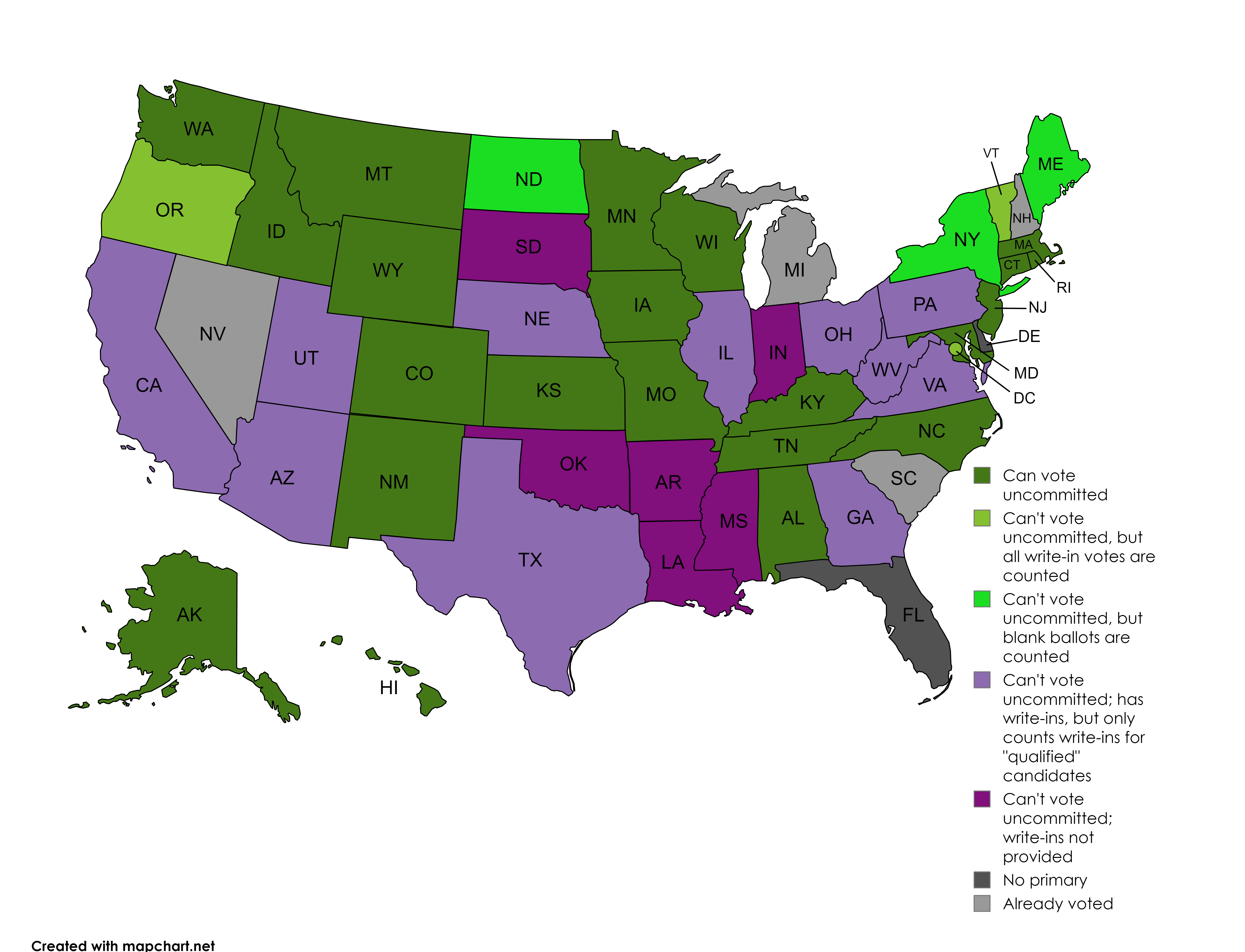I am not ettingermentum
A link to the article: https://www.ettingermentum.news/p/the-uncommitted-voters-guide
the article (for those that dont wanna go to substack):
Earlier this week, when I was talking with my girlfriend about the Michigan primary results, she asked me if we could also vote uncommitted in our state’s primary. Since we live in Georgia, I knew that we didn’t have that option, so I told her that it wasn’t possible and that I personally planned to use my ballot to write in Jane Fonda. Then she asked me if that vote would be counted, which made me realize something: I didn’t know if it would. I looked it up, and and after a bit of searching, I learned that the answer was no. As a Georgia voter, I have to either vote for one of the three names on the ballot or a “validated write-in candidate” or my vote will be discarded. My year-old plan to vote for Jane had always been DOA, and I had never known it until that moment.
This got me thinking. If I, someone who writes about politics for a living, didn’t know the exact procedures for a protest vote in my primary in my own state, how many prospective uncommitted voters out there actually know what their options are? I presumed that someone out there had published a guide for how to protest vote in each state, but, at least as far as I can tell, such a guide does not exist. To remedy this problem, I decided to create a guide myself. The following is the first ever state-by-state, territory-by-territory cheat sheet for how you can, and cannot, cast a protest vote against this administration in your upcoming Democratic primary.
State Rules Map
Below is a quick map I made to visualize the different voting regimes in each state. Full explanations of the categories in the legend, along well as the dates for each primary and caucus, are provided in the following sections.
(see posted image)
Category 1: Can Vote Uncommitted
This is the simplest and most straightforward category. In these states and territories, voters are given a Michigan-style uncommitted option on their ballots. These ballots are fully counted in the results like votes for any of the named candidates. If the total uncommitted vote reaches 15% statewide or in a congressional district, it will be awarded delegates.
Although some of these states have additional protest voting options in addition to uncommitted, selecting the uncommitted line is the most direct and straightforward way to register an anti-Biden vote. If available, it should be chosen over all other options, including write-ins, blank ballots, or votes for named candidates like Dean Phillips or Marianne Williamson.
State/territory list:
March 5th: Alabama, Colorado (Called “Noncomitted”), Iowa (Mail-only Caucus), Massachusetts (Called “No Preference”), Minnesota, North Carolina (Called “No Preference”), Tennessee, American Samoa
March 6th: Hawaii
March 12th: Northern Mariana Islands, Washington, Democrats Abroad
March 19th: Kansas
March 23rd: Missouri
April 2nd: Connecticut, Rhode Island, Wisconsin
April 6th: Alaska (Called “Undeclared”)
April 13th: Wyoming (Caucus, Called “Undeclared”)
May 14th: Maryland
May 21st: Kentucky
May 23rd: Idaho (Caucus)
June 4th: Montana (Called “No Preference”), New Jersey, New Mexico
June 8th: Virgin Islands
Category 2: No Uncommitted Option, But Can Vote Write-Ins
Following the set of states and territories that provide straightforward uncommitted option, we reach a small, unique category of primary contests. These states do not provide an uncommitted option, but they do allow for write-in votes, and they take the unique step of tallying every single one of these write-ins in their vote totals. This allows for voters to vote for whoever they want, from Abraham Lincoln to the demiurge, and still see their ballots counted in a broad “write-in” pile of general dissent.
Unlike uncommitted votes, write-in votes will not be able to win delegates as a category—they are only tallied together as a group convenience on election results pages for the sake of convenience. Legally, they all represent votes for entirely different candidates. While it would technically be possible for a write-in candidate to win delegates if they hit the required benchmarks through write-in votes for them, there are currently no efforts to coordinate this. As such, feel free to vote for whoever or whatever you want if you live in these states or territories.
State/territory list:
March 5th: Vermont
May 21st: Oregon
June 4th: Washington, D.C.
Category 3: No Uncommitted Option, Most Write-Ins Not Tallied, But Blank Votes Tallied
Right on the heels of the previous small list with very specific rules is another small list with even more specific rules. Like Category 2, these states do not provide an option to vote uncommitted, but allow for write-ins. Where they differ from the Category 2 states is that they do not count most write-ins in their overall tallies. To save time, only write-in votes for “qualified” write in candidates are considered valid and counted. This means that any write-in vote that says something like “ceasefire,” “uncommitted,” and, yes, “Jane Fonda,” will be discarded.
For most states that do this and don’t provide an uncommitted option, this rules out the possibility of a protest vote beyond voting for the named candidates. These states are the exception, however. Unlike most states, they count blank ballots in their totals. While blank ballots cannot earn delegates, they are counted as a bloc, making them a clear statement of opposition to Biden that avoids providing support for Phillips or Williamson. As such, it is best to send back ballots in these states.
State/territory list:
March 5th: Maine
March 30th: North Dakota (Caucus)
April 2nd: New York
April 28th: Puerto Rico
Category 4: No Uncommitted Option, Most Write-Ins Not Counted, Blank Ballots Not Counted
Category 4 states have easily the most delegates of any section on this list. Unfortunately, they’re also where the options for protest votes become sharply limited. These states have similar rules as Category 3 states. They don’t provide an uncommitted ballot line and don’t tally write-in votes except for those given to qualified write-in candidates. What makes them different from Category 3 states is that they also don’t count blank votes in their tallies.
To register a non-Biden vote in the tallies here, you have to vote for someone pre-approved by the state, whether that be a named candidates on the ballot or a qualified write-in candidate. For most states, this leaves you with Dean Phillips and/or Marianne Williamson if you want your vote to count. Feel free to choose between the two at your own discretion, although you can always vote for another listed candidate or even prick someone from your state’s list of qualified write-in candidates if you really want to avoid voting for either of them.
State/territory list:
March 5th: California (Both Dean and Marianne on ballot), Texas (D and M), Virginia (D and M), Utah (D and M)
March 12th: Georgia (D and M)
March 19th: Arizona (D and M), Illinois (D and M), Ohio (Dean only)
April 23rd: Pennsylvania (Dean only)
May 14th: Nebraska (Dean only), West Virginia (Dean only)
Category 5: No Uncommitted Option, No Write-in Option, Blank Ballots Not Counted
Category 5 is very similar to Category 4, except with one difference. Instead of just making the write-in option functionally useless, these states don’t provide it at all. There’s no way to get around voting for one of the named candidates of you want to cast a protest vote in these states.
State/territory list:
March 5th: Arkansas (D and M), Oklahoma (D and M)
March 12th: Mississippi (No D or M or anyone else. Biden will just get 100% of the vote here. They’re still holding the contest, though.)
March 23rd: Louisiana (D and M)
June 4th: South Dakota (D and M)
June 8th: Guam (Candidate list currently unavailable)
Category 6: No Primary
Here’s the strangest section of them all. These states just cancelled their primaries and handed all of their delegates to Biden. They won’t let you vote against him even if you want to!
State/territory list: Florida and Delaware


 Roderic Day on Twitter
Roderic Day on Twitter Roderic Day on Red Sails
Roderic Day on Red Sails
What does this mean? He voted no.